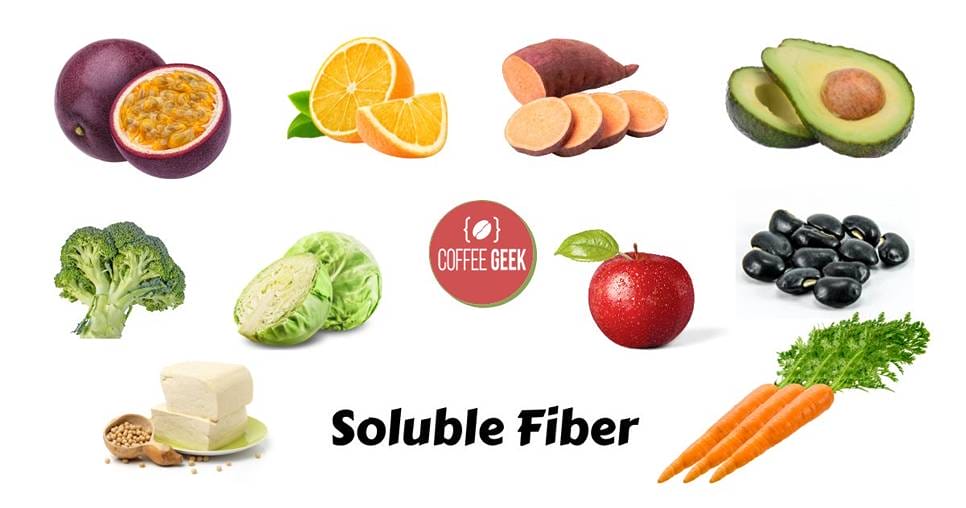As a universal daily ritual, drinking coffee has become an intrinsic part of cultures worldwide.
However, beyond its compact energy kick and fragrant aroma, coffee also contains the vantage of dietary fiber, specifically soluble fiber.
The complex dance between fiber in coffee and our metabolic processes brings about a myriad of benefits, including digestion improvement, cholesterol reduction, and blood sugar control.
In this article, we unravel the mystery that surrounds fiber in coffee and explore its dietary benefits and role in maintaining your health.
Difference Between Soluble and Insoluble Fiber in Coffee Beans
Understanding What Soluble Fiber Is
Soluble fiber transforms into a gel-like substance in the stomach after dissolving in water.
It’s found in large quantities in coffee beans. This type of fiber can slow down digestion, helping to stabilize blood sugar levels and increase feelings of fullness.

Distinguishing Soluble Fiber from Insoluble Fiber in Coffee
While coffee contains soluble dietary fiber, insoluble fiber, commonly found in whole grains and broccoli, is noticeably absent.
It’s the soluble fiber in coffee that plays a significant role in regulating glucose and low-density lipoprotein (LDL) cholesterol levels in the body.
How Roasting Affects the Fiber Content of Coffee Beans
Fulgencio Saura-Calixto, a Madrid-based researcher, discovered that the coffee roasting process enhances the amount of soluble dietary fiber.
Thus, whether your preference is arabica or robusta, the roasting level can increase the fiber content.
Role of Fiber Intake from Coffee in a Balanced Diet
The Importance of Dietary Fiber in Diet
According to health studies, including a healthy amount of fiber into your daily diet can support bowel health and promote healthy cholesterol and sugar levels.
Most Western diets, however, lack sufficient dietary fiber, so the fiber in coffee contributes a much-needed boost.
How Much Fiber Can One Get from Drinking Coffee
A single cup of coffee can contain up to 1.8 grams of fiber, according to Saura-Calixto’s study. Espresso contains 1.5 grams per serving.

To reach the daily recommended fiber intake of 30g, you’d need to drink around 17 cups of espresso. However, this isn’t encouraged because of caffeine content.
Comparison of Fiber in Espresso and Brewed Coffee
While espresso contains 1.5 grams of fiber, brewed coffee offers slightly more, with 1.8 grams per serving.
That said, brewing does not significantly alter the coffee’s fiber content, since both methods extract the soluble fiber.
Unearthing the Truth: Does Orange Juice Contain More Fiber Than Coffee?
The Fiber Content in Orange Juice: A Closer Look
Contrary to popular belief, coffee contains more fiber than orange juice. Although orange juice does provide dietary fiber, it doesn’t contain as much as coffee.

Fiber Content in a Cup of Coffee
An 8-ounce cup of coffee has about 1.8 grams of fiber, making it an excellent source of soluble fiber.
The rich antioxidant properties paired with its fiber content make your cup of joe more beneficial you might imagine.
Fact-Checking: Orange Juice VS. Coffee for Dietary Fiber
Comparatively, a cup of coffee provides significantly more fiber than a serving of orange juice. Therefore, if you’re looking for a beverage that offers a fiber boost, coffee is your best bet.
| Coffee Type | Fiber Content (per 8 oz cup) |
|---|---|
| Black Coffee (brewed) | 0 g |
| Espresso | 0 g |
| Instant Coffee | 0.5 g |
| Decaffeinated Coffee | 0 g |
| Cappuccino (with milk) | 0.5 g (from milk) |
| Latte (with milk) | 0.5 g (from milk) |
| Cold Brew | 0 g |
| Turkish Coffee | 0.5 g |
Health Implications of Adding Fiber to Your Coffee
Impact on Blood Sugar Levels
Since soluble fiber slows the absorption of sugar, it can help improve blood sugar levels by preventing spikes after eating.
This is essential for individuals managing their glucose levels.
The Effect on Diabetes: Can Soluble Fiber in Coffee Help?
Studies suggest that the soluble fiber in coffee might help manage diabetes by influencing carbohydrate metabolism and improving insulin sensitivity. It appears coffee is more than just a morning stimulant.
Boosting Metabolism with Fiber: Is it Possible?
There’s growing evidence that the fiber found in coffee can support metabolism.
It aids the digestive system, promotes gut health, and can contribute to weight management.
Ways to Incorporate More Fiber into Your Daily Coffee Intake
Adding Fiber to Instant Coffee: Is it Beneficial?
Notably, instant coffee boasts a decent fiber content, similar to brewed coffee.
So, adding fiber supplements to your instant coffee may increase your daily intake. However, always consider the overall balance of your diet.
The Best Foods to Pair with Coffee for Increased Fiber Intake
Pairing coffee with fiber-rich foods like whole grains can drastically increase your daily fiber intake.
In fact, enjoying a cup of coffee toast with whole grain bread might just become your new breakfast champion.

Should You Consider Coffee as a Primary Source of Dietary Fiber?
While coffee can contribute to your daily fiber intake, it shouldn’t be considered a primary source.
As with all things, moderation is key. Balance coffee with other fiber-rich foods for a diverse, health-supportive diet.
FAQ
Does coffee actually contain fiber?
Yes, in fact, coffee is one of the common beverages that do contain fiber.
It has a dietary soluble fiber which can provide health benefits such as reducing cholesterol and blood sugar spikes.
The fiber content is even present in decaffeinated coffee, so you can still enjoy the health benefits regardless of your choice.
How can I incorporate more fiber into their coffee?
You may think it’s strange, but freshly roasted coffee indeed has fiber.
However, if you want to increase the fiber content in your coffee, consider adding a soluble fiber supplement, typically available as a capsule or gel.
When mixed with coffee, it becomes a great source of daily intake plenty of fiber into your routine.
How much fiber is in my daily cup of coffee?
The fiber content can vary depending on how the coffee is prepared, but studies show that a typical cup of freeze-dried coffee can contain almost 2 grams of fiber.
This may not be a large amount, but it certainly adds up to your daily recommended amount of fiber.
Why do people keep mentioning the fiber content in coffee?
One more reason people love coffee is because of the fact that coffee contains a good amount of dietary soluble fiber.
This type of fiber attracts water and turns to gel during digestion, which can help slow the emptying of your stomach and stabilize blood sugar levels, reducing the risk of heart disease.
Will I get as much fiber in a cup of coffee as I would in other foods that contain fiber?
No, coffee doesn’t provide as much fiber as foods that are known for their high levels of fiber, like fruits, vegetables, and whole grains.
However, it can contribute a fraction to your daily recommended amount of fiber intake.
Does coffee in Madrid contain a large amount of fiber?
Coffee in Madrid, as with coffee anywhere in the world, does contain fiber but not in large amounts.
A cup of coffee can contribute to your daily fiber intake but it isn’t a replacement for foods rich in fiber.
Does decaffeinated coffee also contain fiber?
Yes, the process to decaffeinate coffee does not remove the fiber content.
So, whether you prefer regular or decaffeinated coffee, you are still getting the health benefits of fiber with each cup.
Can drinking coffee help reduce constipation?
Yes, the dietary soluble fiber in coffee can support a healthy bowel movement.
This kind of fiber softens the stool and can help reduce the uncomfortable symptoms of constipation.
Can you count coffee as part of your daily fiber intake?
Yes, you can. Coffee does have a small amount of fiber, so it adds a fraction to your daily fiber intake.
However, always remember that it should not be the primary source of fiber in your diet.
How does fiber in coffee affect the intestine?
The fiber in coffee can help the intestine by attracting water and forming a gel-like substance, which can help slow digestion and make you feel fuller, potentially aiding in weight loss.
It also helps add bulk to your stool, promoting regular bowel movements and improving overall intestinal health.

